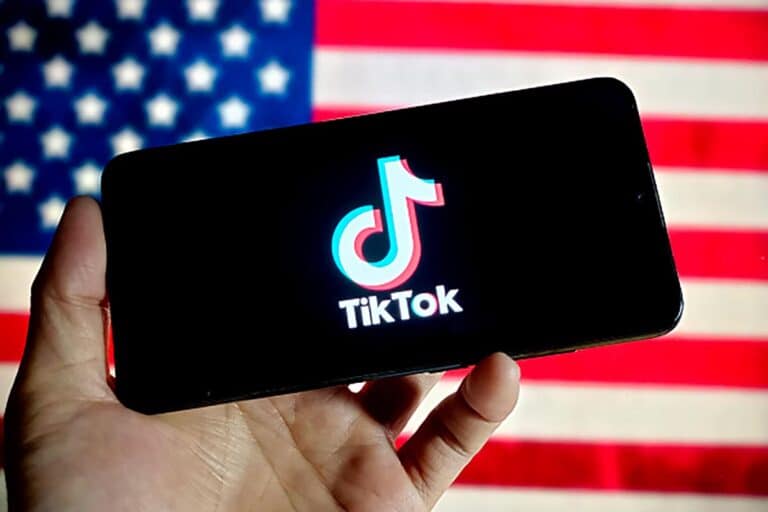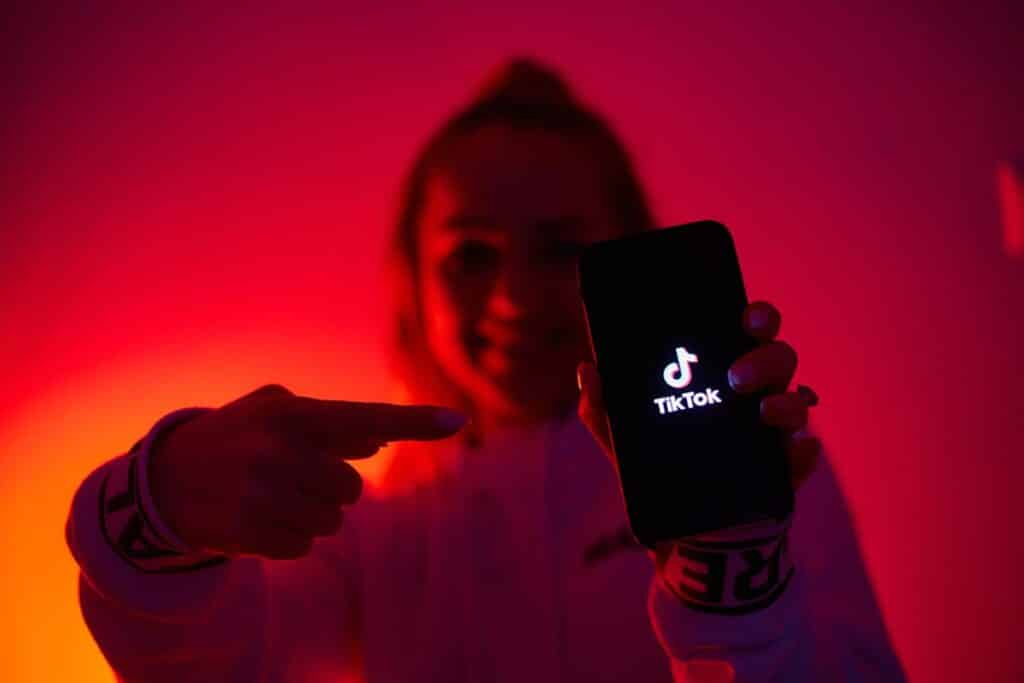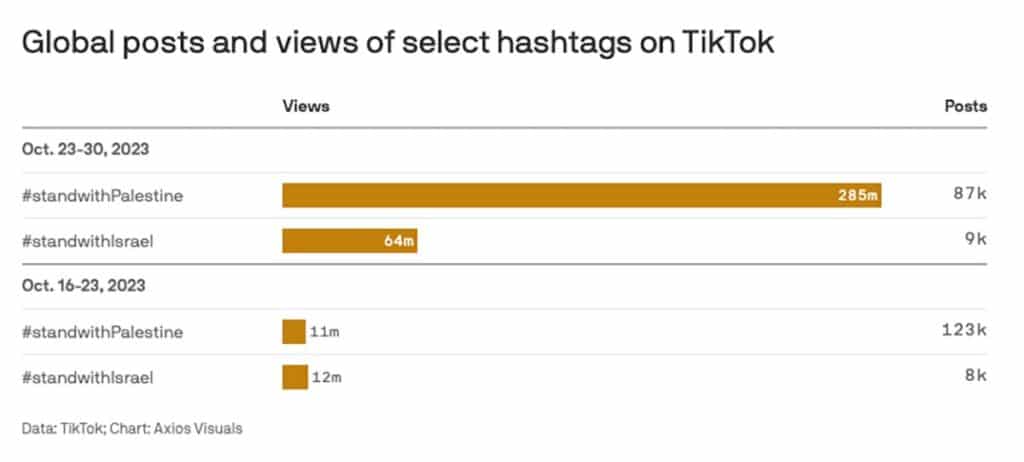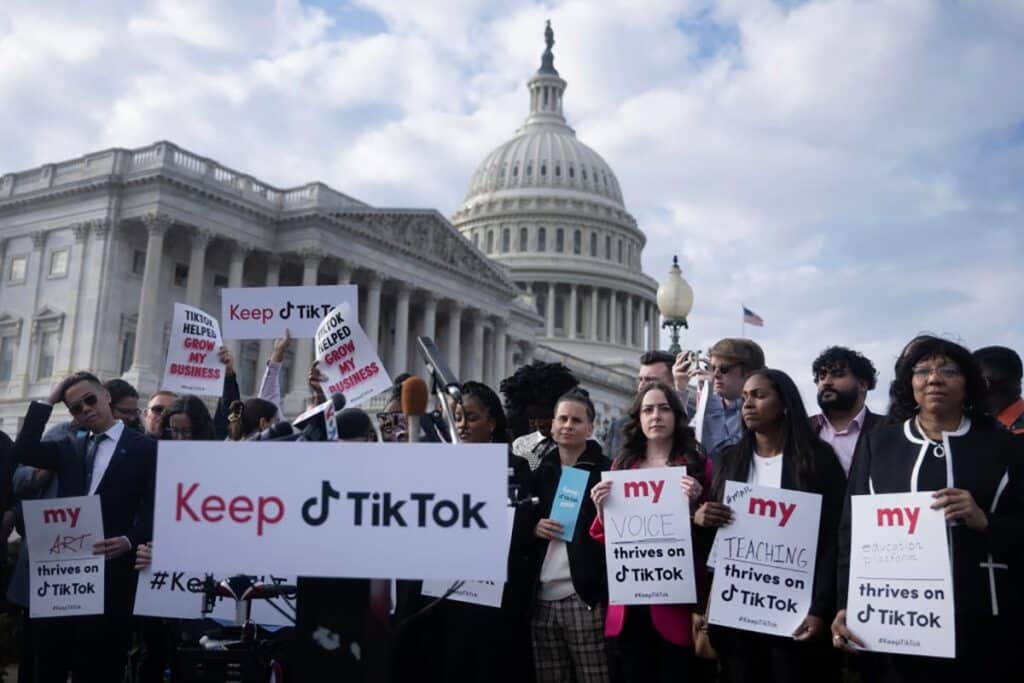
The House of Representatives overwhelmingly voted to force ByteDance, a company with ties to the Chinese Communist Party, to sell TikTok or face a ban in the U.S. on March 13.
The Protecting Americans from Foreign Adversary Controlled Applications Act passed with a 352-65 vote with bipartisan support.
If the bill is signed into law and TikTok does not sell its app, companies like Apple and Google will not allow TikTok to be available on their respective app stores.
Politicians supporting the bill cite national security concerns as the primary reason for the ban, rather than issues related to content. Meanwhile, the Jewish community is also engaging in a debate over the ban focusing on the prevalence of antisemitism on the platform.
As a constitutional matter, I am neutral with respect to what is said on TikTok.
— Ritchie Torres (@RitchieTorres) March 14, 2024
I am not neutral with respect to who owns TikTok.
Ownership, not speech, is the target of a TikTok divestment from ByteDance.
Let’s unpack the rationale behind the potential TikTok ban, the extent of antisemitism on TikTok compared to other platforms, and what Jewish Gen Zers think about the possible ban.
Read more: Why are people saying Jews are “behind” the ban of TikTok?
What are the concerns with TikTok?

U.S. national security experts are concerned about Chinese policies that TikTok must submit information about its over 100 million American users if requested. Experts fear that Americans’ identity information, location data and browsing history are being shared with the CCP.
Some evidence has been released to the public that this is happening. Forbes reported that ByteDance planned to use TikTok to monitor certain American users’ locations. Similarly, The New York Times reported that ByteDance inappropriately accessed the personal data of American tech journalists and those close to them to try to identify the whistleblowers who exposed the plan.
I told @SquawkCNBC that giving the CCP access to 100M+ Americans is insane.
— Joe Lonsdale (@JTLonsdale) March 19, 2024
Some of my smart friends are concerned the House bill will be abused. This was my issue with the original Restrict Act — which I opposed.
This bill is different; Senate should mark it up and pass it!🧵 pic.twitter.com/WXp1JX8S1i
There are concerns that the Chinese government is using TikTok to spy on Americans by collecting U.S. user data, and could leverage the app’s powerful algorithm to push stances supported by the Chinese government and skew American public opinion. In addition, there are concerns that TikTok is being used to cultivate unhealthy internet addictions in Gen Z.
Senators from both parties received a classified briefing from national security leaders in which the experts presented evidence and their “unanimous opinion” that TikTok is a danger to national security.
Several legislators are calling for the revelations from this briefing to be made public so that the American people can better understand the threat.
“The reality is that we have that entity having that much personal data, access to, and that much potential to manipulate content on a platform that a lot of young people look to as their No. 1 news source,” Democratic Senator Mark Warner said.
TikTok denies its connection to the CCP and that its algorithm pushes a political agenda. The company said in a statement that the measure would strip Americans of their right to free expression and would “damage millions of businesses…and destroy the livelihoods of countless creators.”
“This is a ban on the app in this country,” @tiktok_us CEO Shou Zi Chew tells hill reporters, “It is going to impact 170 million Americans who use our app…it's going to impact 7 million small businesses. And I hope their voices are heard.” pic.twitter.com/hLkEapT46Q
— Alan He (@alanhe) March 14, 2024
How likely is TikTok to be banned or divested?
Senate Majority Leader Chuck Schumer has not yet announced when a vote on the bill will happen. Whether the act will pass the Senate remains uncertain. The bill has faced significant pushback from the public with many legislators receiving threats over their support for the ban. Schumer said he is still “talking to members of (his) caucus to decide the best path forward.”
Meanwhile, President Joe Biden said that if the bill reaches his office, he will sign it into law.
Biden says he would sign a TikTok bill that could ban the app. https://t.co/uL8H2mfLhT
— CBS News (@CBSNews) March 8, 2024
Is there more antisemitism and anti-Israel content on TikTok compared to other platforms?
A January 2024 report from Cyberwell found that there has been an 86% rise in antisemitic content across all platforms since Oct. 7.
The report found that X saw the most frequent “denial and distortion of the events of Oct. 7” and adherence to its own moderation policies.
X was reportedly responsible for 47% of the antisemitic posts in the data set and only took down 2% of the posts flagged for Oct. 7 denialism. TikTok was responsible for 17% of the posts with a 7% takedown rate.
A January 2024 report from Cyberwell found that there has been an 86% rise in antisemitic content across all platforms since Oct. 7.
Other reports found a 1000% spike in antisemitic posts on X following the start of the Israel-Hamas War.
Critics accuse TikTok of silencing Jewish and pro-Israel voices and pushing pro-Palestinian and anti-Israel content on users’ feeds — even if they have not engaged with similar accounts or content previously.
According to data from TikTok reported by Axios, between Oct. 16-Oct. 30, there were 210,000 posts using the hashtag #StandwithPalestine and only 17,000 using the hashtag #StandwithIsrael, resulting in a higher view count for pro-Palestine content.

However, Axios reported that this can be partly attributed to the user base on TikTok who tend to be younger and more likely to sympathize with Palestine compared to older generations.
According to the ADL, between 2021 and 2023, the percentage of adults who have been harassed on TikTok rose from 5% to 19%.
However, the full extent of antisemitism online can never be fully known as social media companies have refused to provide that data to researchers and journalists.
What do Gen Z and Millennials think about the ban?
In a 2023 poll, a majority (53%) of Gen Z respondents said they opposed a ban, while 34% said they supported it. Millennials, on the other hand, supported the ban by a margin of 49% to 34%.
However, respondents under 42 were twice as likely to express concern that “TikTok is owned by ByteDance, a company that was founded in China and reported to have close ties to the Chinese Communist Party.”
After being told that the Chinese government collected data from TikTok users and promoted propaganda, both Gen Z and Millennials were more likely to express support for a ban.
Gen Z overwhelmingly had a favorable view of TikTok (66%), while Millennials were split between a 46% favorable opinion and 42% unfavorable of TikTok.
What does Jewish Gen Z think?

In interviews with The Forward, Jewish TikTokers overwhelmingly said they opposed a ban on the app. Jewish creators acknowledged the prevalence of antisemitism on TikTok but emphasized that the platform allows them to stand up against antisemitism and express their Jewish identity.
Many of them said that TikTok has given them a platform to educate others about Jewish customs, reaching audiences who would not have access to this information otherwise.
However, concerns about TikTok’s handling of antisemitism persist. A report by Jewish Insider revealed that Jewish content creators on TikTok have faced a significant increase in antisemitic hate following the Oct. 7 attacks.
The creators interviewed said that the platform’s response has been inadequate, with lax moderation policies allowing hateful content to remain. The situation has led some, including Holocaust survivor Gidon Lev, to leave the platform due to the overwhelming presence of hate speech and the lack of effective action from TikTok’s moderators.
Jewish Gen Z voices opposing the ban
Unpacked spoke with five members of Jewish Gen Z from diverse backgrounds, who are identified only by their first names for privacy reasons. Most interviewed by Unpacked opposed the ban, but many expressed nuance in their views. Here’s what they said:
Olivia, a 19-year-old California-based college student, is against the TikTok ban. She believes the app is a great way to find community online and has become the news outlet of choice for her and most of her friends.
Olivia also values TikTok for connecting her with Jewish content, such as learning about Orthodox Judaism from creators like Miriam Ezagui.
@miriamezagui Replying to @barbarasuesanantonio What does the phrase B’sha Tova mean? #superstition #pregnancy #congratulations #mazaltov
♬ original sound – Miriam Ezagui
“I’m not comfortable going to an Orthodox shul, but I like learning from Miriam,” she explained. “I don’t use Instagram, so if TikTok isn’t there anymore, I won’t be able to watch. I’m against the ban. It’ll be a loss to the Jewish community.”
Danielle, a 24-year-old New York-based graduate student, agreed that a TikTok ban would negatively impact her. She spends more time on TikTok than all her other apps combined and has found a sense of connection to the Jewish community through the app, especially since Oct. 7, when sentiments on her campus became overwhelmingly anti-Israel.
“It feels nice to see other Jewish people on [TikTok] … It makes me feel a bit less lonely,” she told Unpacked.
“It feels nice to see other Jewish people on [TikTok] … It makes me feel a bit less lonely.”
Emma, a 23-year-old in New York City, opposes the ban, viewing it as a right-wing attempt to censor Gen-Z’s political activism, despite the bill passing the House with bipartisan support.
She criticized the focus on TikTok, arguing that Chinese and Russian bots and misinformation are present on other platforms as well.
However, Emma acknowledged that “Antisemitism is rampant on TikTok,” leading her to avoid sharing her Jewish identity on the platform.
The toll of seeing hate speech and misinformation has begun to outweigh the positives of TikTok for Emma. She might take a permanent break from content creation if the ban is put into place.
“As much fun as I have making videos and while I’m morally against the ban, I’m kind of excited for it to be gone. It might be so, so, so much better for my mental health.”
“As much fun as I have making videos and while I’m morally against the ban, I’m kind of excited for it to be gone. It might be so, so, so much better for my mental health.”
Jewish Gen Z voices supporting or having neutral stances toward the ban
Other Jewish members of Gen Z feel differently, either supporting the ban or feeling more neutral toward it.
Jonathan, a 26-year-old lawyer based in New York, has never downloaded TikTok and chooses to not watch TikTok videos because he disagrees with the company’s practices. He said he’s “ecstatic” about the potential sale or ban of TikTok, citing national security concerns and the “brain rot” it has caused in his peers.
“I’m not comfortable with my information being given to the Chinese government — or any government to be frank. I think banning TikTok is probably in the best interest of the American people,” he told Unpacked.
“I think banning TikTok is probably in the best interest of the American people. People shouldn’t feel so bad about TikTok because there are other options, which are safer.”
Jonathan prefers other platforms for short-form videos, such as YouTube or X.
“There are a lot of other apps to watch short-form videos. People shouldn’t feel so bad about TikTok because there are other options, which are safer,” he commented.
Dylan, 23, who works in finance in Boston, has a neutral stance toward the ban, believing that the government should focus more on the war in Ukraine and the Israel-Hamas war than this issue.
While he watches TikTok most days, Dylan always feels like he needs to be more vigilant about the information presented in each video — something he says he doesn’t feel the same need to do while watching videos on other platforms.
Dylan expressed concern about the impact of short-form video content on Gen Z. Studies have shown that watching many short clips on platforms like TikTok or Instagram can shorten attention span and cause what has been dubbed “TikTok brain,” which is marked by the need for instant gratification.
“My attention span’s shot now. It got really bad during the pandemic when I would watch TikTok during class for hours a day. I can’t see any positives for being on TikTok for hours, which my friends and I often will do,” he said.
“My attention span’s shot now. It got really bad during the pandemic…I can’t see any positives for being on TikTok for hours, which my friends and I often will do.”
How has the Jewish organizational world reacted to the potential TikTok ban?
The Jewish organizational world is divided on the potential TikTok ban, in the context of antisemitism on the platform. The Anti-Defamation League and American Jewish Congress have expressed opposition to the ban, while the Jewish Federations of North America (JFNA) supports it.
ADL CEO Jonathan Greenblatt said he did not support the ban because he views TikTok as an integral tool for young people to connect. Instead, he urged the platform to take stronger measures against hate speech.
An ADL spokesperson echoed this sentiment, emphasizing the need for TikTok to actively prevent antisemitism and limit hate speech in comments.
Ted Deutch, CEO of the American Jewish Congress, believes that TikTok helps broaden the audience for educational content about Jewish practices and Israeli culture. He advocates for Jewish groups to push social media platforms to enforce their existing conduct policies more effectively.
JFNA, one of the most prominent Jewish organizations in the country, announced its support of the bill in a letter to Congress.
“The single most important issue to our Jewish communities today is the dramatic rise in antisemitism,” JFNA wrote. “Our community understands that social media is a major driver of the drive in antisemitism and that TikTok is the worst offender by far.”
All three organizations have criticized both TikTok and X for high rates of antisemitism and anti-Israel content, accusing the platforms of amplifying misinformation and antisemitic voices.
Originally Published Mar 24, 2024 10:52PM EDT


